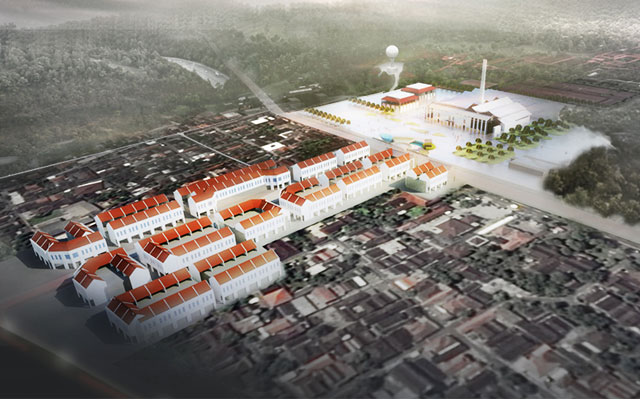Indonesia’s city of Solo will soon welcome a new cultural centre and events venue, named De Tjolomadoe, and buzz is building around its March 24 launch after Canadian musician and songwriter David Foster christened its concert hall with a performance earlier this week.
Standing on 6.4ha of land in Colomadu, Karanganyar Regency, the main building houses a concert hall, multi-purpose hall, cultural centre and commercial area. The site also has two outdoor venues for open air events such as carnivals, music and dance performances.

This would be the first of six stages of the De Tjolomadu project, which covers a total area of 21ha. Later phases will include construction of a convention and exhibition centre, themed shopping mall, and four-star hotel.
De Tjolomadoe was reborn from a building previously occupied by a sugar factory by the same name. The factory, which was built in 1861, had been abandoned since its closure in 1998.
The development has taken up 200 billion rupiah (US$15.4 million) in investment on a 30-year BOT term with the land owner, National Plantation 9.
Linda Gustina, director of commercial and hospitality of developer PP Properti, a consortium member of Sinergi Colomadu, said: “Solo is well known for its culture and De Tjolomadoe will become a (new) cultural centre. We are inviting artists and art curators to take a role in (bringing this) attraction (to life).”
“With an international standard concert hall, Solo now not only can attract major Indonesian performers but also international artists of David Foster’s calibre, who will in turn draw visitors, at least from the neighbouring countries,” Linda said.
Preserved elements from the old factory preserved include machines, the chimney tower and even part of an old banyan tree, which serve as exhibits and windows into the past for visitors to the new attraction.
Edison Suardi, general manager construction of Sinergi Colomadu, said: “The whole building serves as a Sugar Factory Museum, where travellers can walk around and learn about its history. Although each room now has a different function, visitors can still find traces of the past. The steel planks in the repair room, for example, now become the base of the restaurant’s tables.”





















